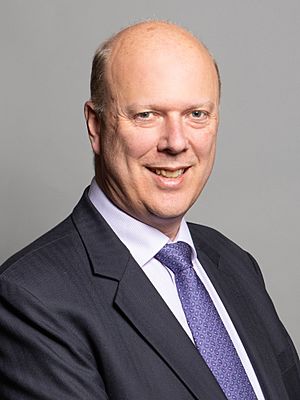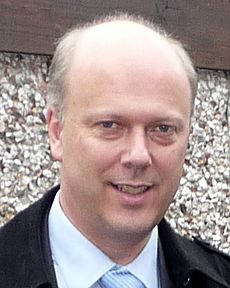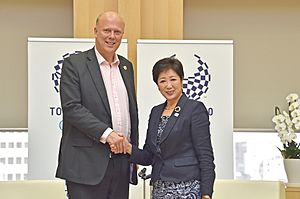Chris Grayling facts for kids
Quick facts for kids
The Lord Grayling
|
|||||||||||||||||||||||||||||||||||||||||||||
|---|---|---|---|---|---|---|---|---|---|---|---|---|---|---|---|---|---|---|---|---|---|---|---|---|---|---|---|---|---|---|---|---|---|---|---|---|---|---|---|---|---|---|---|---|---|

Official portrait, 2020
|
|||||||||||||||||||||||||||||||||||||||||||||
|
|||||||||||||||||||||||||||||||||||||||||||||
| In office 4 September 2012 – 9 May 2015 |
|||||||||||||||||||||||||||||||||||||||||||||
| Prime Minister | David Cameron | ||||||||||||||||||||||||||||||||||||||||||||
| Preceded by | Kenneth Clarke | ||||||||||||||||||||||||||||||||||||||||||||
| Succeeded by | Michael Gove | ||||||||||||||||||||||||||||||||||||||||||||
| Secretary of State for Transport | |||||||||||||||||||||||||||||||||||||||||||||
| In office 14 July 2016 – 24 July 2019 |
|||||||||||||||||||||||||||||||||||||||||||||
| Prime Minister | Theresa May | ||||||||||||||||||||||||||||||||||||||||||||
| Preceded by | Patrick McLoughlin | ||||||||||||||||||||||||||||||||||||||||||||
| Succeeded by | Grant Shapps | ||||||||||||||||||||||||||||||||||||||||||||
| Leader of the House of Commons | |||||||||||||||||||||||||||||||||||||||||||||
| In office 9 May 2015 – 13 July 2016 |
|||||||||||||||||||||||||||||||||||||||||||||
| Prime Minister | David Cameron | ||||||||||||||||||||||||||||||||||||||||||||
| Preceded by | William Hague | ||||||||||||||||||||||||||||||||||||||||||||
| Succeeded by | David Lidington | ||||||||||||||||||||||||||||||||||||||||||||
| Lord President of the Council | |||||||||||||||||||||||||||||||||||||||||||||
| In office 9 May 2015 – 14 July 2016 |
|||||||||||||||||||||||||||||||||||||||||||||
| Prime Minister | David Cameron | ||||||||||||||||||||||||||||||||||||||||||||
| Preceded by | Nick Clegg | ||||||||||||||||||||||||||||||||||||||||||||
| Succeeded by | David Lidington | ||||||||||||||||||||||||||||||||||||||||||||
| Minister of State for Employment | |||||||||||||||||||||||||||||||||||||||||||||
| In office 13 May 2010 – 4 September 2012 |
|||||||||||||||||||||||||||||||||||||||||||||
| Prime Minister | David Cameron | ||||||||||||||||||||||||||||||||||||||||||||
| Preceded by | Jim Knight | ||||||||||||||||||||||||||||||||||||||||||||
| Succeeded by | Mark Hoban | ||||||||||||||||||||||||||||||||||||||||||||
|
|||||||||||||||||||||||||||||||||||||||||||||
| Member of the House of Lords Lord Temporal |
|||||||||||||||||||||||||||||||||||||||||||||
| Assumed office 20 August 2024 Life peerage |
|||||||||||||||||||||||||||||||||||||||||||||
| Member of Parliament for Epsom and Ewell |
|||||||||||||||||||||||||||||||||||||||||||||
| In office 7 June 2001 – 30 May 2024 |
|||||||||||||||||||||||||||||||||||||||||||||
| Preceded by | Archie Hamilton | ||||||||||||||||||||||||||||||||||||||||||||
| Succeeded by | Helen Maguire | ||||||||||||||||||||||||||||||||||||||||||||
| Personal details | |||||||||||||||||||||||||||||||||||||||||||||
| Born |
Christopher Stephen Grayling
1 April 1962 London, England |
||||||||||||||||||||||||||||||||||||||||||||
| Political party | Conservative (1988–present) | ||||||||||||||||||||||||||||||||||||||||||||
| Other political affiliations |
SDP (before 1988) | ||||||||||||||||||||||||||||||||||||||||||||
| Spouse | Susan Dillistone | ||||||||||||||||||||||||||||||||||||||||||||
| Children | 2 | ||||||||||||||||||||||||||||||||||||||||||||
| Residences | Ashtead, Surrey, England | ||||||||||||||||||||||||||||||||||||||||||||
| Alma mater | Sidney Sussex College, Cambridge | ||||||||||||||||||||||||||||||||||||||||||||
Christopher Stephen Grayling, Baron Grayling (born 1 April 1962) is a British politician and author. He held several important roles in the UK government. These included Secretary of State for Justice from 2012 to 2015, Leader of the House of Commons from 2015 to 2016, and Secretary of State for Transport from 2016 to 2019. He was a Member of Parliament (MP) for Epsom and Ewell from 2001 to 2024. He is a member of the Conservative Party. Before becoming a politician, Grayling worked in television and film.
Contents
Early Life and Education
Christopher Grayling was born in London on April 1, 1962. He grew up in Buckinghamshire, where he attended the Royal Grammar School, High Wycombe. After school, he went to Sidney Sussex College, Cambridge. In 1984, he earned a degree in history.
Career Before Politics
Grayling started his career at BBC News in 1985 as a trainee. He became a producer in 1986. In 1988, he moved to Channel 4 to work as an editor. He returned to the BBC in 1991. Later, he managed several television production companies. Before joining the Conservative Party, Grayling was a member of the Social Democratic Party until 1988. From 1997 until he became an MP, he worked as a public relations consultant.
Starting in Politics
Local Councillor Role
Grayling first tried to become an MP in 1997 but was not elected. However, in 1998, he was elected as a local councillor for the Hillside ward in the London Borough of Merton. He served on the council until 2002.
Becoming a Member of Parliament
In the 2001 general election, Grayling was elected to the House of Commons. He represented the area of Epsom and Ewell in Surrey. He won with a large majority and continued to be the MP for this area until 2024.
Shadow Cabinet Roles
From 2001, Grayling served on a special committee for Environment, Transport, and the Regions. In 2002, he was promoted to the Opposition Whips' Office. He then became a spokesperson for Health and later for Education and Skills.
After the 2005 general election, he joined the Shadow Cabinet. He served as Shadow Leader of the House of Commons. When David Cameron became the leader of the Conservative Party in 2005, Grayling became the Shadow Secretary of State for Transport. In 2007, he was made Shadow Secretary of State for Work and Pensions. In 2009, he became Shadow Home Secretary.
Grayling was known for challenging leading politicians from the Labour Party. He questioned ministers about their business dealings and how they handled important issues.
Debates on Public Spending
Between 2001 and 2009, Grayling claimed expenses for a flat near Parliament. He said he needed it for late working hours. During a time when MPs' expenses were being looked at closely, a newspaper reported that he had spent money on refitting his flat. This caused some discussion, especially since he had previously criticized other politicians for similar issues.
Public Statements and Debates
As Shadow Home Secretary, Grayling made some comments that caused debate. In 2009, he compared an area in Manchester to a TV crime show. Local people and police disagreed with his description, saying that crime rates had actually fallen. Grayling defended his comments, saying he was highlighting serious issues.
He also faced criticism for how the Conservative Party used crime statistics. The UK Statistics Authority said the figures he used could mislead the public. However, a report suggested his claims might have been justified depending on how the numbers were calculated.
Grayling also spoke about the rights of business owners. He said that people running small bed and breakfast businesses from their homes should have the right to choose their customers. This led to a debate about fairness and equality. He later apologized for any offense caused by his comments.
Important Government Roles
Minister for Employment
After the 2010 general election, Grayling was appointed Minister of State for Employment in May 2010. In this role, he was in charge of jobcentres. He introduced measures to reduce costs and help people find work. He also worked on programs to help long-term unemployed people.
Secretary of State for Justice
On September 4, 2012, Grayling was promoted to the Cabinet. He became Lord Chancellor and Secretary of State for Justice. He was the first person in at least 440 years to hold the Lord Chancellor role without being a lawyer.
Grayling focused on a "tough justice" approach. This included changes to how offenders were rehabilitated to reduce reoffending. He also introduced new rules for prisons, such as a ban on parcels being sent in, which was later ruled illegal by the High Court. His department also faced criticism for the way probation services were reformed, though later reports showed some positive outcomes.
He also introduced changes to legal aid, which helps people pay for legal advice. These changes were criticized by many in the legal profession. In 2013, Grayling initiated the process that led to Alan Turing receiving a pardon from the Queen.
Leader of the House of Commons
After the 2015 general election, Grayling was appointed Leader of the House of Commons. This role involves managing government business in Parliament. He also became Lord President of the Council.
Grayling played a key role in Theresa May's campaign to become the leader of the Conservative Party and Prime Minister in 2016.
Secretary of State for Transport
In July 2016, Grayling became Secretary of State for Transport when Theresa May became Prime Minister. During his time in this role, he faced several challenges and controversies.
Transport Decisions and Challenges
- In 2016, he blocked a plan to give control of some London metro services to Transport for London.
- In 2017, he cancelled several railway electrification projects in northern England. This decision was criticized by passengers and politicians.
- In 2018, a new railway timetable caused widespread disruption and train cancellations. Grayling faced a vote of confidence in Parliament but remained in his position.
- Following a drone incident at Gatwick Airport in December 2018, reports suggested he had ignored warnings about drone threats.
- His department awarded contracts to ferry companies to prepare for a "no-deal" Brexit. One of these companies, Seaborne Freight, had never run a ferry service and owned no ships. This contract was later cancelled, leading to further criticism.
- There were also delays and cost increases with the introduction of new Class 800 trains.
Life After Being a Minister
In July 2019, Grayling left the Cabinet when Boris Johnson became Prime Minister. Johnson hoped Grayling would become the head of the Intelligence and Security Committee of Parliament. However, another Conservative MP, Julian Lewis, won the vote instead. Grayling later resigned from the committee.
In May 2020, Grayling was appointed as a trustee of the National Portrait Gallery. He was reappointed in December 2023. In September 2020, he took on a role advising a port company on its environmental strategy.
In October 2023, Grayling announced he had been diagnosed with prostate cancer. He said that while his treatment was successful, it made him decide not to seek re-election as an MP in 2024. In March 2024, he asked for more train services in his area during rush hour. In May 2024, he received an award for his work on reducing deforestation and protecting British wildlife.
Becoming a Lord
After stepping down as an MP, Grayling was made a life peer in August 2024. This means he became a member of the House of Lords and is now known as Baron Grayling.
Personal Life
Grayling is married to Susan Dillistone. They have two children. He lives in Ashtead, Surrey.
See also
 In Spanish: Chris Grayling para niños
In Spanish: Chris Grayling para niños
 | Lonnie Johnson |
 | Granville Woods |
 | Lewis Howard Latimer |
 | James West |



